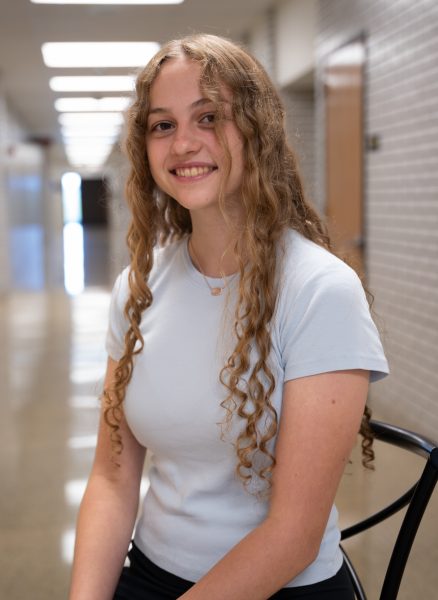You’re one of NA’s highest achieving students. What’s your secret?
My academic success has been the result of many factors: supportive teachers, unique school opportunities, consistent hard work, and a genuine curiosity to learn. I’m grateful that NA offers students the flexibility to pursue advanced coursework early. I was able to skip several levels of math before high school, which let me take AP math classes sooner. NA also offers a pathway for students to take AP science courses earlier—I took a college chemistry class over the summer, which allowed me to enroll in AP Chemistry as a sophomore. I tried to challenge myself each year by taking as many AP classes as possible, and I also took seven college courses at CCAC and CMU during the school year and summer to explore subjects not available at NA. Thanks to these AP and college classes, I’ll be graduating with both a high school diploma and a 2-year A.S. degree in Mathematics & Sciences from CCAC.
What’s your go-to study strategy?
My go-to study strategy for end-of-year exams is watching review videos at 2x speed with subtitles. I’ve found that this helps me absorb the most information in the shortest amount of time (even when reviewing an entire year’s curriculum the day before an AP exam). Channels like Heimler’s History, Mr. Sinn, The Organic Chemistry Tutor, Mr. Smedes, Flipping Physics, and Fleet’s AP Art History have been incredibly helpful over the past four years and played a big role in my success on AP exams. During the school year, I typically review class slides or note packets before unit exams. I was lucky to have AP teachers who put together excellent study materials.
What motivates you to work so hard in academics?
Every successful person I’ve observed—from CEOs of leading tech companies to Nobel laureates—has one thing in common: they work relentlessly, every day, to create a future they’re excited about. Their work-life balance is unique: they devote themselves entirely to their work, yet it doesn’t feel like work because they love what they do. I strive to embody that same mindset because I’m passionate about learning as much as I can to help build a future that inspires others.
What are your plans for after graduation?
I will study Computer Science, Electrical Engineering, and Neuroscience at the University of California, Berkeley. Thanks to the AP and college-level course offerings at NA, I will be able to enter Berkeley as a junior. I plan to use the extra time to complete a Master’s degree in three years or begin working towards a PhD early.
What direction would you like to go in for your future career?
I ultimately hope to lead a research center or startup focused on developing Brain-Computer Interfaces. The possibilities are extraordinary—from enabling blind individuals to see to restoring motor function in people with paralysis to addressing neurological disorders like schizophrenia. In the future, BCIs could even allow for telepathic communication, direct knowledge transfer, and a mutualistic symbiosis with Artificial Superintelligence. I firmly believe that Brain-Computer Interfaces will fundamentally transform society.
What do you invest yourself in outside of academics, and how do you make time for it?
Outside of school, I research neural networks for computer vision robotics at Carnegie Mellon University’s Robotics Institute; play as first-chair cellist at the Pittsburgh Youth Concert Orchestra; compete internationally in olympiads, debate, and FIRST robotics; teach STEM classes to students in inner-city Pittsburgh; and organize local robotics tournaments and fundraisers. Making time for these different passions has not been easy, but they’ve been a great opportunity to build my time-management skills over the years. Today, I use a to-do-list app with dates and times to block out time for all my commitments.
Of all your academic achievements, which one are you the proudest of?
I’m most proud of winning 1st place in Lincoln-Douglas debate at the International Olympiad in Forensics—a culmination of my debate journey across 20+ tournaments, from debating with friends at Harvard to traveling as a team to PA states.
How many AP classes have you taken, and which were the easiest/hardest?
I’ve taken 22 AP classes throughout high school. As someone more oriented towards STEM, I found the language and history courses (AP Art History, European History, Spanish, and English Language) the most challenging. The classes that came most naturally to me were AP Environmental Science, Physics, Computer Science, Economics, Psychology, and U.S. Government & Comparative Politics.
What’s something you think most people wouldn’t guess about you?
I’m vegan! Learning about the exploitation of dairy cows and the ravaging environmental impacts of the meat industry was a gut-wrenching experience for me. I also switched to being vegan for health reasons: dairy is inflammatory and has been linked to diabetes, and consumption of red meats greatly increases one’s risk for heart disease.
Do you have advice for students who want to achieve high GPAs, or is there any particular academic advice you’ve found to be the most helpful?
My number one piece of advice—not just for students aiming for high GPAs, but for all students—is to pay attention in class. We’re fortunate to have some of the best AP teachers in the country at NA, and learning directly from them is the most effective way to master the material. I also strongly recommend managing your time well and staying organized. That’s a skill I’ve had to develop, and it’s been essential to succeeding in both my high school and college courses, as well as in my extracurriculars. Without a dated to-do list, I wouldn’t have been able to balance all my commitments.


